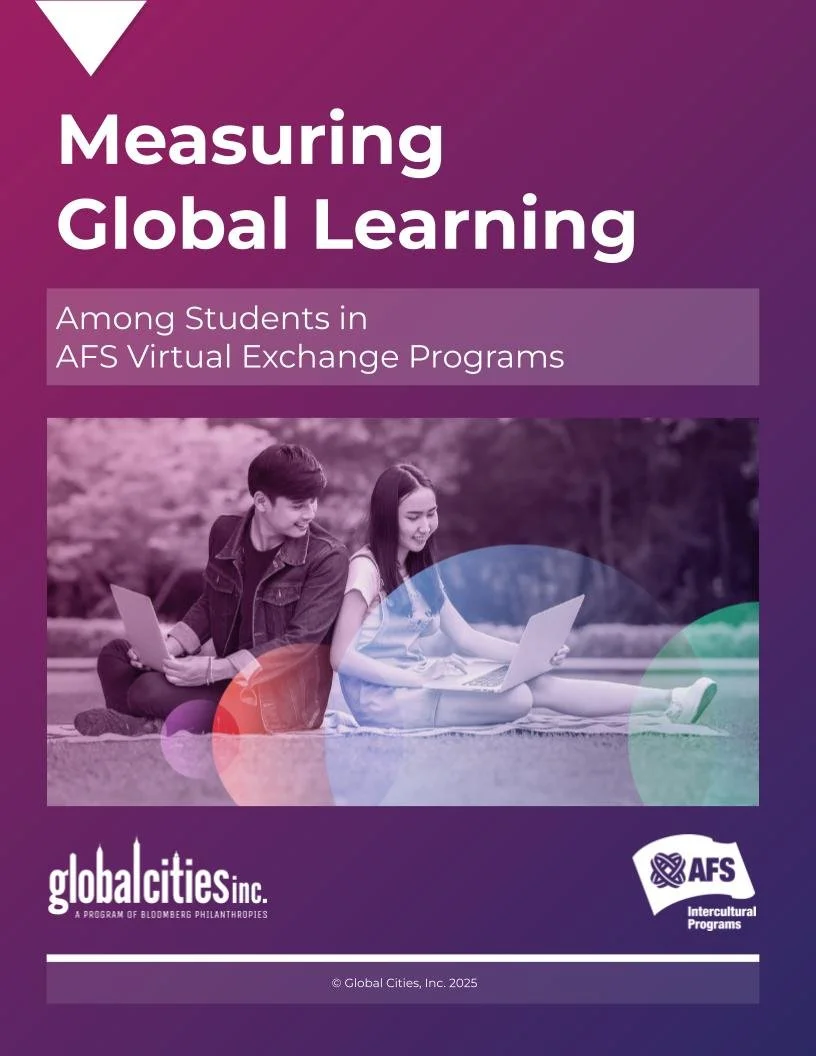codebook case studies
measuring global learning among students in afs virtual exchange programs
Global Cities, Inc. and AFS, two leaders in the field of global competency education, partnered on research that is critical for demonstrating that teenage students can learn global competency, and significantly, that programs designed to teach global competency can be evaluated.
This study used the Global Cities Codebook for Global Student Learning Outcomes (the Codebook) to better understand how AFS virtual exchange programs are working and to determine whether students enrolled in the AFS Global Up Teen (GUP Teen) or Global You Changemaker (GYC) programs were developing global competence. It also demonstrates that the Codebook can be applied to a variety of global competency curricula to identify what students are learning and the aspects of the curriculum and program model that drive student growth. By using the Codebook to identify the types of curricular topics and activities that promote global learning, this study provides insight into the effectiveness of the AFS global learning model in achieving its curricular goals. This research advances this new evaluation methodology in the field of global competency education, which can be used in any K-12 program or classroom to identify student progress.
Key Findings:
Many students were able to discuss their own and others’ cultures. Modules that explicitly prompted such discussions of culture were more likely to elicit more detailed cultural descriptions. For example, when students were asked to think about an object that represents a culture or group with which they identify and then explain the significance of that object, we saw greater prevalence of Cultural Understanding indicators.
Structured opportunities for exchange led to students listening to and interacting respectfully with each other. The virtual discussion boards that are part of both program models created a learning environment conducive to demonstration of Appreciation for Diversity indicators.
Two of the most frequently coded indicators in the GYC curriculum related to students’ recognition of their capacity to contribute to local, regional, or global improvement and willingness to do so, attitudes critical to Global Engagement.
While the GYC curriculum included projects that provided explicit opportunities for students to take action on global issues, the GUP Teen curriculum demonstrates that even a hypothetical discussion of future actions can help build student efficacy.
recommendations for enhancing global learning
Foster respectful dialogue through peer interaction. Interaction, even in virtual environments, is essential for practicing respectful listening and dialogue.
Encourage deeper reflection. When providing prompts for writing or discussion, ask students to explain the significance of what they are sharing, not just to describe or provide facts.
Provide scaffolds and templates for new concepts. Students may be encountering unfamiliar ideas and concepts, providing explicit scaffolds and templates can support their ability to engage with the material effectively.
Empower students by asking for involvement. Project-based curricula that provide structured opportunities for student action can be effective in developing student recognition of their capacity and willingness to contribute to local, regional, or global improvement.

